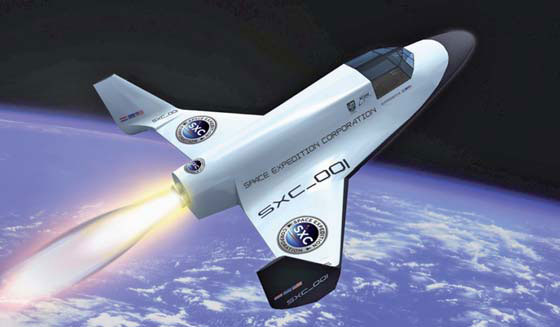Space: China's final tourism frontier
About a tenth of all tickets to take a ride on a US commercial rocket have been sold on Chinese mainland
It was nighttime at a Beijing gym and a banker was in the ring. Tong Jingjing was repeatedly knocked down by her boxing coach, and tears and sweat mingled on her face.
The banker, Tong, 41, pretty, single, and with a high-powered financial job, was in training to toughen up after spending $100,000 on a travel ticket five months ago.
A space travel ticket.
It started when she was trying to clinch a business deal.
A private banking product manager, Tong provides investment and tailored travel services for clients with assets of more than 1 billion yuan (about $163 million).
With the North and South poles open to tourists, Tong was looking for other destinations to attract rich clients. She discovered space travel.
United States-based XCOR Aerospace is developing the Lynx spacecraft, aiming to take tourists into space as early as 2015. The company began to sell tickets in China at the end of 2013.
It offers two kinds of flights: one to an altitude of 60 km for a price of $95,000, the other to an altitude of 103 km for $100,000.
An altitude of 100 km is regarded as the boundary between the Earth's atmospheric layer and outer space, says Du Xiyong, vice-president of Zhejiang Dexo Travel Co. Ltd., XCOR's China's agent.
The Lynx spacecraft, still in the test stage, is designed to carry one astronaut and one passenger, who will wear a space suit. Each journey takes more than one hour, with five or six minutes in outer space.
Tong had no plans to go to space. She accompanied a rich female client to Dexo to ask about the details of the journey, such as its impact on health and the insurance requirements.
After several inquiries, the client hesitated, but Tong bought a ticket, becoming the first Chinese woman to pay for a space flight.
"Flying to outer space in my early 40s will be a wonderful experience," says Tong, who has been to the North Pole, South Pole and Tibet, and aspires to marry and become a mother.
"Many Chinese have a wait-and-see attitude to space tourism. I don't worry about safety, because hundreds of tourists from other countries will go ahead of me," she says.
"After I come back, many rich Chinese will buy a ticket."
Many adventurous and wealthy Chinese already have, Du says. More than 30 tickets have been sold on the Chinese mainland, about a tenth of the total sold worldwide.
They include Hong Kong singer Gloria Tang and mainland celebrity Han Geng.
"Most ticket buyers are male and entrepreneurs, mainly aged between 30 and 45," says Du.
"We thought that Chinese were relatively conservative, but space travel suits those with an adventurous spirit. The market reaction has exceeded expectations."
Another ticket buyer, Sheng Tianxing, who grew up in a small town in Shaoxing in East China's Zhejiang province, is so keen that he uses the name "Skywalker" in English.
Sheng brought 30 copies of Stephen Hawking's book A Brief History of Time and gave them to his friends, but they were less enthusiastic.
A bit of a maverick, Sheng quit a comfortable job at a bank to set up his own business developing new tea products.
Going to space is a lifelong dream, but he never thought he would do it until he read that space flight tickets would be sold on China's Taobao shopping website.
"I have been waiting for this for so long, and suddenly it happens," Sheng says.
His wife and mother worry about his safety and his friends say it's not worth it. Only his 12-year-old son says it's cool.
"I think the price is well worth it. My dream will be realized, and it has no monetary value," Sheng says.
"To see our blue planet at that altitude must be totally different from seeing satellite photos or movies."
He knows nothing about the technology of the spacecraft, and says he has to trust the aerospace company.
"I only think about the enjoyment of losing gravity and the moment I see the huge arc of the Earth."
However, Tong, a financial risk control expert, has carefully considered the safety aspect.
Her father worked in a factory designing and making components and parts for spacecraft for 30 years before retiring, although she has no idea where the components and parts were used.
Tong studied finance at Beihang University, a Beijing aeronautics institute, and based on her experience there, she believes the technology is safe.
She has not told her parents about her journey yet, in case they worry, but she told her sister, a doctor in the United States, who supports her.
Du says any healthy adult can take a space journey as long as they are free of serious heart conditions, high blood pressure and epilepsy.
However, Tong is determined to toughen up for the trip because she knows that the hardest part will be withstanding four times the Earth's gravity when reentering the atmosphere, so she took up boxing.
She also plans to undergo zero-gravity training in Russia and to learn to fly.
"If there is an accident, I can accept it," she adds.
Tong is optimistic about the aerospace industry in China and wants to invest in China's first private rocket company.
"Now we can travel to space only on an American-made spaceship. I hope Chinese can have space tours in our own spacecraft in the future."
www.icrosschina.com
|
Lynx spacecraft developed by XCOR Aerospace, based in Mojave, California. |



















